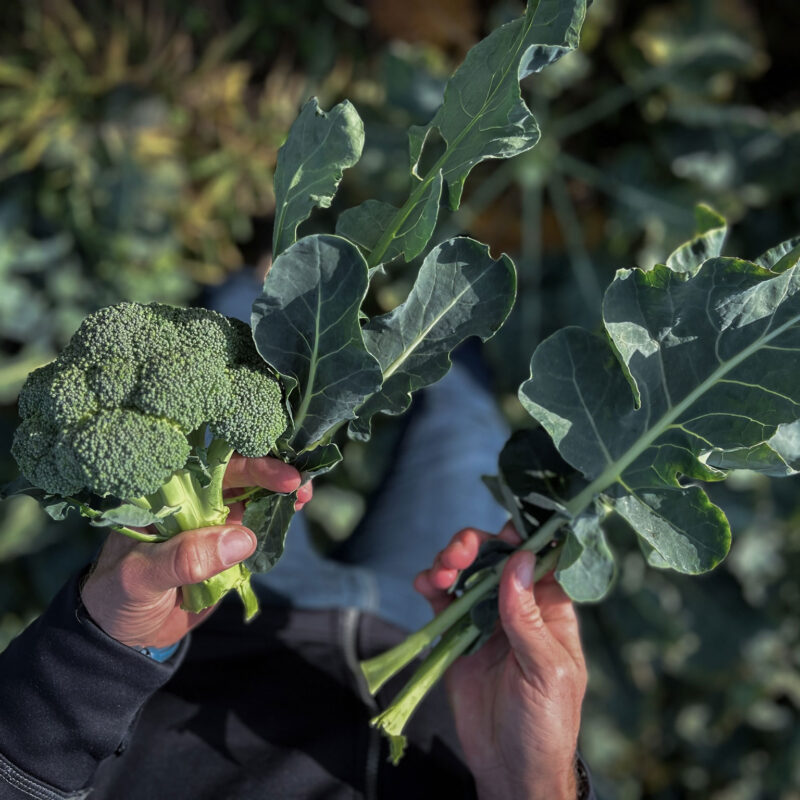“I knew the method was revolutionary”
2024.12.10

A modern cultural creamed steel-cut barley made from hydrothermally processed whole grains was served in the Blue Hall. © Nobel Prize Outreach. Photo: Dan Lepp
What was the story with the porridge at the Nobel Banquet? And what about the pancakes prepared in institutional kitchens for eldercare the week before? Both featured hydrothermally treated whole grain, an innovation by Hidden in Grains, developed with Axfoundation and partners at Torsåker Farm within the Mineral Shift project.
The 2024 Nobel Prize Banquet highlighted public health and Swedish ingredients. The main course of the Banquet was served with a modern cultural creamed steel-cut barley with wild and cultivated mushrooms, Jerusalem artichoke and roasted chicken jus with Pomme de Vie.
The porridge resulted from the Mineral Shift project, led by Axfoundation in collaboration with Hidden in Grains, Warbro Kvarn, and MatLust Development Hub. The hydrothermal treatment of the grains increases the bioavailability of minerals, paving the way for improved public health and a reduced climate footprint. The Nobel Banquet catapulted this innovation into the global spotlight.
We aim to contribute to improved public health and a reduced climate footprint, and the Nobel Banquet confirms the significance of this innovation.
– Anna Henning Moberg, Head of Operations at Torsåker Farm, Axfoundation
Reducing meat consumption and eating more plant-based foods, along with increasing the intake of whole grains and legumes, are among the most crucial changes for creating a sustainable food system.
This is why Axfoundation’s Anna Henning Moberg recognized that Hidden in Grains had a groundbreaking solution when she met the founder and innovator Kerstin Fredlund in the 2010s. The hydrothermal treatment of grains, a traditional technique further developed by Fredlund, enables the body to absorb nearly as many minerals from whole grains as from meat. This led to a long-term collaboration, involving the entire value chain.
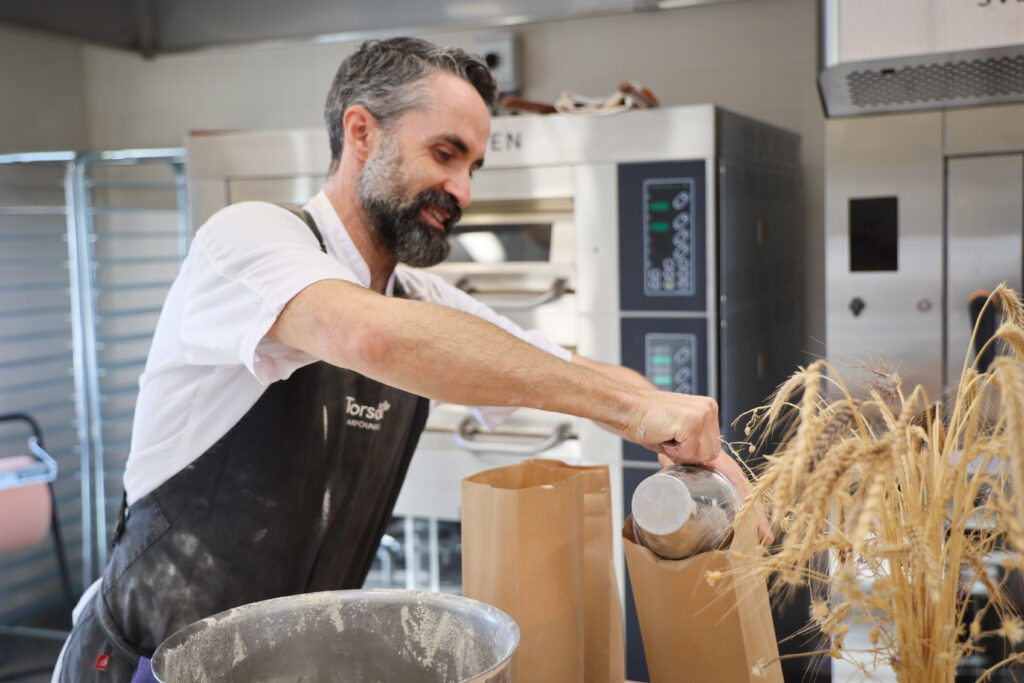
David Fredlund at Hidden Grains has spent considerable time in the test kitchens at Torsåker Farm.
– It is with great joy and pride that we see the whole grain porridge, a result of the Mineral Shift project, represented at the Nobel Banquet. Our mission is practical application of research, and this is an example of achieving that. We are equally proud that it is also being tested in institutional kitchens for eldercare facilities and schools. We aim to contribute to improved public health and a reduced climate footprint, and the Nobel Banquet confirms the significance of this innovation, says Anna Henning Moberg.
The Mineral Shift project had just gotten underway when Warbro Kvarn unfortunately burned down in 2022. Axfoundation then offered its partners the opportunity to continue the testing operations at Torsåker Farm. The necessary equipment was available there, the network expanded, and things gained momentum.
– Axfoundation’s invitation led to us starting to collaborate with all the amazing people at Torsåker Farm. We wouldn’t be where we are today without them, says David Fredlund, CEO of Hidden in Grains.
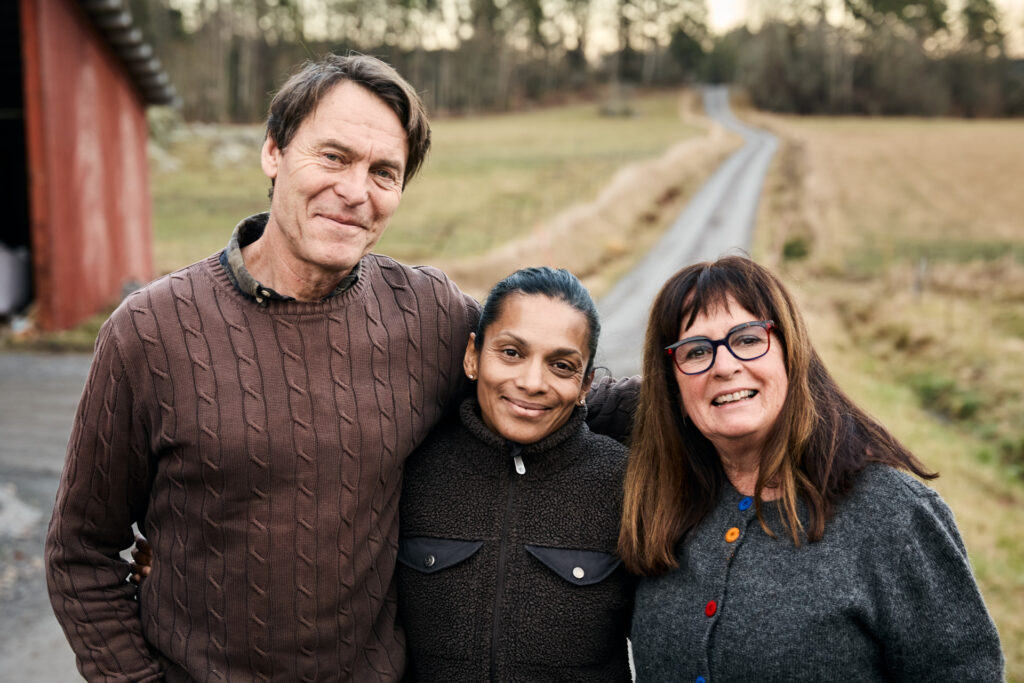
Thomas Björklund, CEO of Warbro Kvarn, Jessie Sommarström, chef, and Kerstin Fredlund, founder of Hidden Grains, celebrate the breakthrough for whole grain at the Nobel Banquet. Photo: Dan Lepp.
Thomas Björklund, CEO of Warbro Kvarn, agrees that it was a stroke of luck that the project ended up at Torsåker Farm.
– It was a perfect fit. The team at Torsåker does an impressive job, and everything took off quickly. It turned out to be a very successful initiative, says Thomas.
Chef Jessie Sommarström, who was responsible for the appetizer and main course at the Nobel Banquet, has been a close collaborator with Axfoundation for several years and an ambassador for multiple projects. Jessie’s food philosophy revolves around sustainability and health, and in her hands, the Mineral Shift project was transformed into the somewhat unorthodox choice for a Nobel occasion – whole grain porridge.
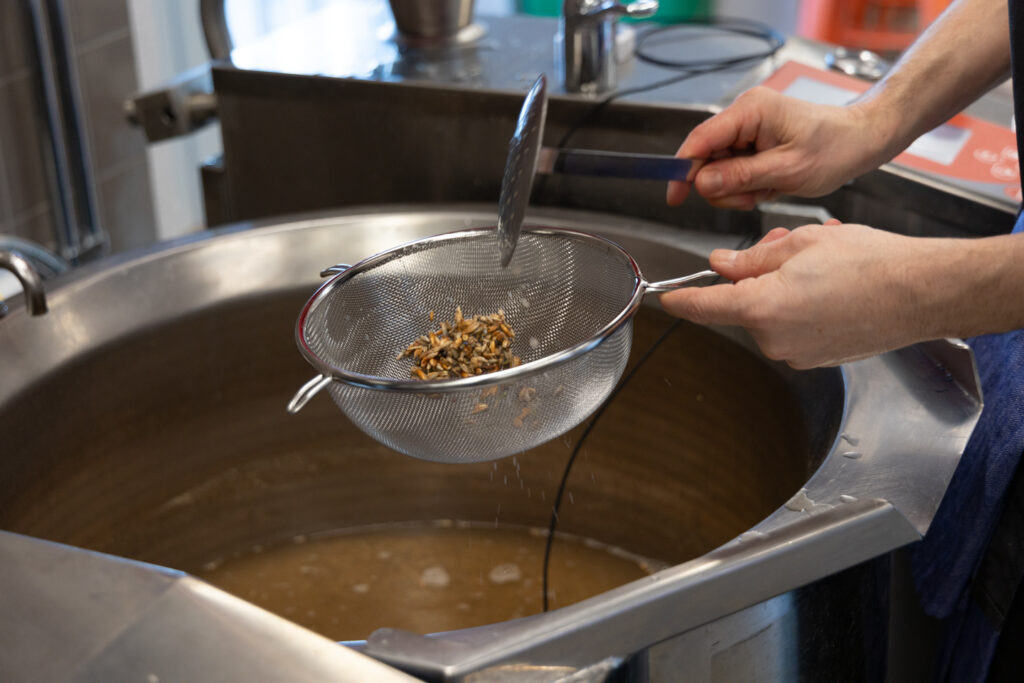
Through hydrothermal treatment up to 99 percent of the antinutrient phytic acid can be broken down and more iron and zinc, becomes available for absorption.
– The lack of whole grains is the leading food-related cause of poor health in Sweden. Whole grains are nutritious, delicious, and filling. In the test kitchens at Torsåker Farm, I have developed and refined my philosophy in close collaboration with the team at Axfoundation, explains Jessie.
The hydrothermal treatment involves soaking, drying, dehulling, and milling the grains, which makes the minerals more accessible for absorption by the body – almost as much as from meat. In the Mineral Shift project, this innovative technique is being further developed to create the next generation of tasty and nutritious grain products.
– If the porridge served at the Nobel Banquet is the crowning achievement of the Mineral Shift project, public health remains the central focus of Axfoundation’s efforts. Everyone should have access nutritious food, especially the elderly, says Veronica Öhrvik, Axfoundation’s project manager for the Mineral Shift project.
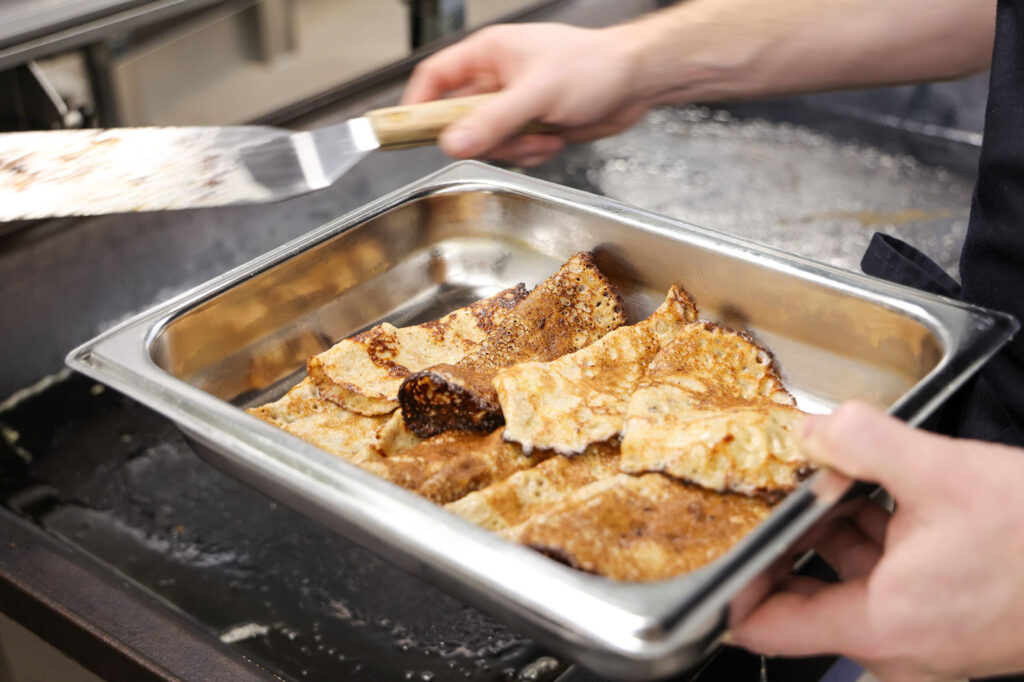
Pancakes made from hydrothermally processed whole grain wheat were prepared by the chefs at Tiohundra’s central kitchen in Norrtälje.
Today, malnutrition among the elderly is a well-documented issue, and according to a Swedish study, only one in ten people aged 65–80 consume the recommended 70–90 grams of whole grains per day. Additionally, 25–30% of young women in Sweden are at risk of iron deficiency anemia.
The week before Nobel Day, pancakes made from hydrothermally treated whole wheat flour were trialed in Tiohundra’s institutional kitchen in Norrtälje as part of the Mineral Shift project. The kitchen supplies meals to eldercare facilities and is a close partner of Axfoundation. They smell and taste like regular pancakes, but the recipe had to be modified to ensure the pancakes hold together.
– The flour behaves differently than regular wheat flour. Now we’ve developed a recipe that works, says the Kitchen Unit Manager Niclas Gerdsling.
I knew the method was revolutionary. Now we are close to making a contribution to public health.
– Kerstin Fredlund, founder of Hidden in Grains.
Kerstin Fredlund, founder of Hidden Grains, has been researching and developing the method for several decades, enabling us to eat more of the nutritious whole grain. Now that the breakthrough is a reality, she is elated.
– I knew the method was revolutionary. But I couldn’t see how it would make its way to the table. When I met everyone at Torsåker Farm, things took off. Now we are close to making a contribution to public health, says Kerstin Fredlund.
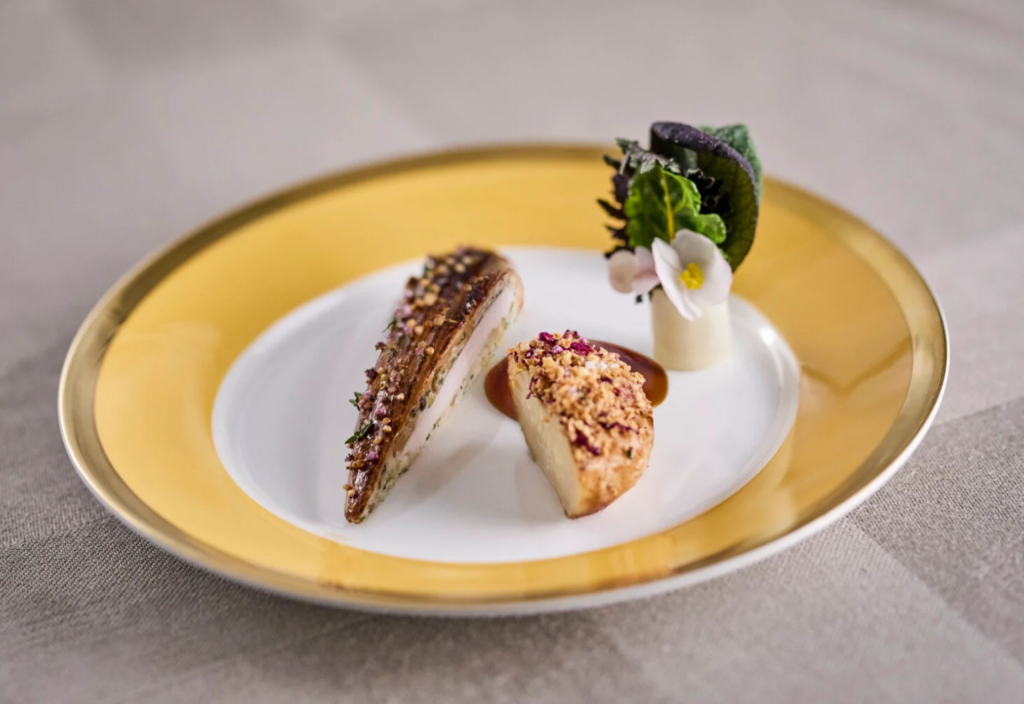
For the main course, a quenelle made from chicken, legumes and truffle was served. © Nobel Prize Outreach. Photo: Dan Lepp
So, what did Jessie Sommarström choose to serve with the porridge at the Nobel Banquet? The main course featured a quenelle made of chicken, Swedish legumes, and autumn truffle from Gotland. It was accompanied by celeriac glazed with miso from Swedish fava beans and a bouquet of cabbage flavored with herbs and apple. The porridge, made with nutrient-rich, hydrothermally treated whole grains, showcased how traditional ingredients can be innovatively refined for the most elegant settings.
This innovation combines versatility and sustainability. It not only improves nutritional intake but also promotes a more sustainable food culture across various sectors of society. The project, Mineral Shift, is led by Axfoundation in collaboration with Hidden in Grains, Warbro Kvarn, and MatLust Development Node. Learn more about the Mineral Shift here.





















